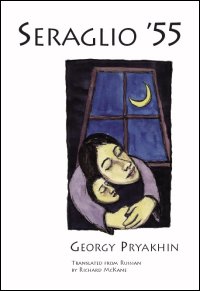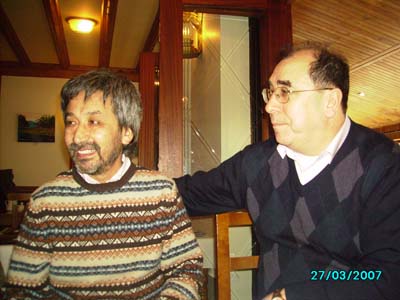
|
Biographical note
Georgy Pryakhin is one of the most esteemed writers in Russia today.
His importance is compounded by his central involvement in the political evolution of Russia.
As a member of Mikhail Gorbachev’s ‘Inner Circle’ of advisors when he was President of the USSR, Pryakhin was one of the architects of ‘Glasnost’ and ‘Perestroika’.
After the collapse of the Soviet Union, he helped found the Russia Revival Party, made up of people who were expelled or resigned from the Communist Party.
Aspiring to the Western social-democrat model, its aim was to provide a left-of-centre alternative to the communist and populist parties.
Georgy Pryakhin was born in 1947 in the Steppes of Stavropol’ye in Southern Russia bordering the Northern Caucasus.
His Uzbek father and Russian mother had been separately exiled to this area by the Stalin Regime, and met there.
They arrived on cattle trains along with thousands of other exiles mainly from Central Asia and lived in open-prison conditions until the curfew was lifted, just before Georgy was born.
Their over-crowded village suffered water shortages, disastrous in the intensely hot summers, and life-expectancy was very short.
Pryakhin was orphaned at a young age and was packed off to one of the Stalin orphanages in the ancient steppe town of Buddenovsk.
It was here, in 1994, that one of the major events of the Chechen Crisis took place.
Chechen separatists, under Shamil Basaev, seized the town and held the population hostage for several days, eventually retreating, using townspeople as human shields.
Up to 170 people were killed and 500 wounded.
A recurring theme in Pryakhin’s books is Buddenovsk as the lost paradise of his heroes’ childhoods.
The characters always return here, but find it is now hell.
After he graduated from Moscow State University, Pryakhin went into journalism and worked for twelve years on Komsomol’skaya Pravda before moving on to television journalism.
At the same time he was rising in the Communist Party as a reformer and had achieved the position of Deputy Division Head of the Central Committee of the CPSU, (Communist Party of the Soviet Union).
When he was sent to deal with the catastrophic earthquake in Armenia in 1988 he met the President of the USSR, Mikhail Gorbachev, and Gorbachev personally invited him to join his Inner Circle of advisors.
For the following years he worked with Gorbachev, while at the same time holding a position as a member of the Central Committee of the Communist Party.
They were eventful years in which Gorbachev and his team attempted to liberalise and modernise the USSR.
Pryakhin’s first narrative, ‘A Boarding School’ was an expose of the Stalinist orphanages, and was published at the end of the Seventies in the legendary radical journal, ‘Novyi Mir’ (it published Solzenitsen’s One Day in the Life of Ivan Denisovich in the 60’s, Pasternak’s Doctor Zhivago in the 80’s), with a preface by the great Chingiz Aytmatov.
The Cold War was still in full swing, so the book was broadcast across the USSR by the Voice of America radio station as anti-Soviet propaganda.
Novyi Mir also published other Pryakhin works, including ‘At the Window’, ‘Tenth Stalin Commandment’, and ‘Day and Hour (What Did Happen?)’.
As one of Gorbachev’s closest associates, Pryakhin was also a close friend of the first lady, Raisa Maksinovna Gorbacheva.
She broke the mould of wives of previous top politicians in the USSR by appearing in public with her husband, wearing smart clothes, and giving interviews in her own right.
A book, ‘I Hope’, by Raisa Gorbacheva, was written in collaboration with Georgy Pryakhin, and appeared just as the abortive coup against Gorbachev brought the USSR tumbling down.
In 1991 Voskresenye was set up under Gorbachev as a non-party non-political publishing house operating under the President’s seal, with Georgy Pryakhin in charge.
Apart from general publishing, this house embarked on an historic project, to publish the Russian Classics, for the first time in many cases, free of Czarist and Stalinist omissions and annotations.
Pushkin, Lermontov, and Dostoyevsky have been done.
In the pipeline is the complete works of Ivan Bunin in 15 volumes – the previous ‘collected works’ amounted to only 9 volumes after anti-Soviet material had been omitted!
Georgy Pryakhin, married with four daughters, lives in Moscow.
He is a member of the Academy of Russian Literature, and is the recipient of the Golden Pen Award.
President Boris Yeltsin presented him with the Pushkin Medal.

Georgy Pryakhin, right, with Hamid Ismailov, the Uzbek novelist and Head of the BBC World Service for Central Asia, who launched 'Seraglio 55' at the Irish Writers' Centre in Dublin.

Richard McKane, right, noted human-rights activist, who translated 'Seraglio 55', with Jack Harte who supplied the Introduction.

Georgy Pryakhin with Mihhail Gorbachev in the foreground.
|





